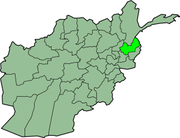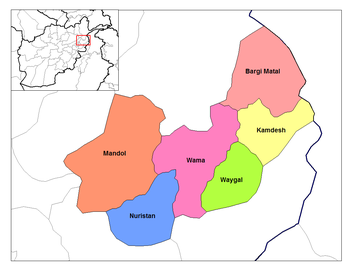- Kaféristan
-
Nourestân (province)
نورستان
(Nurestân)
Administration Pays Afghanistan Type Province Capitale Nourestân Géographie Superficie 9 225 km² Démographie Population 128 400 hab. (est. 2006) Densité 13,9 hab./km² Le Nurestân (ou encore Nouristan, Nourestan, Nuristan) est une province de l'est de l'Afghanistan. Sa capitale est Nourestân.
Dernière province islamisée d'Afghanistan à la fin du XIXe siècle, le Nourestan, anciennement Kafiristan (littéralement « pays des infidèles »), est une région montagneuse, difficile d'accès, centrée sur le massif de l'Hindu Kush.
Elle abriterait encore dans quelques vallées isolées de part et d'autre de la frontière avec le Pakistan, des populations animistes indo-européennes, les Nuristani. Leur origine mystérieuse a donné lieu à de nombreuses théories. Certains[Qui ?] ont vu en eux les descendants des soldats macédoniens d'Alexandre le Grand, d'autres (théoriciens nazis[Qui ?]) les derniers représentants de la « pureté » aryenne des origines susceptibles de légitimer leurs thèses racistes.
Le cœur de la nouvelle L'Homme qui voulut être roi de Rudyard Kipling, adaptée au cinéma par John Huston, se déroule dans cette province.
Sommaire
Districts
- Barg-i Matal
- Doab
- Kamdech
- Mandol
- Nour Gram
- Wama
- Waygal
- Paroun
Population par district
Nombre d'habitants en 2006 District Population Paroun 11 900 Nour Gram 28 700 Doab 6 900 Waigal 17 400 Wama 9 800 Mandol 17 600 Kamdech 22 300 Barg-i Matal 13 800 Total 128 400 Notes et références
Lien externe
Provinces d'Afghanistan 
Badakhchân • Bâdghîs • Baghlân • Balkh • Bâmiyân • Deykandi • Djôzdjân • Farâh • Fâryâb • Ghazni • Ghôr • Helmand • Hérât • Kaboul • Kandahâr • Kâpîssâ • Khôst • Kounar • Kondôz • Laghmân • Lôgar • Nangarhâr • Nimrôz • Nourestân • Orozgân • Paktîkâ • Paktiyâ • Pandjchir • Parwân • Samangân • Sar-é Pol • Takhâr • Wardak • Zâbol Catégorie : Province d'Afghanistan
Wikimedia Foundation. 2010.

